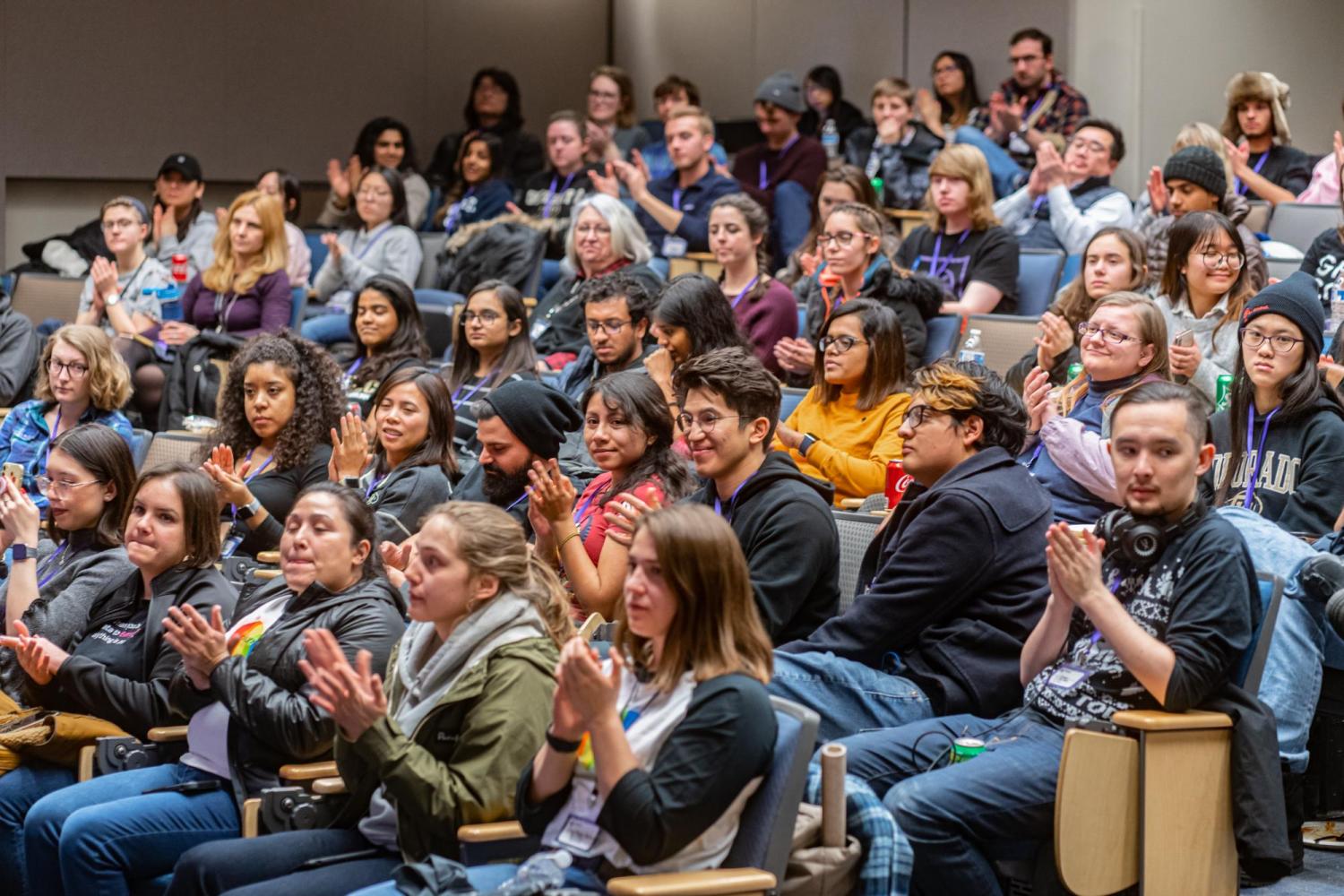T9Hacks 2020 winners announced
More than 150 people attended the fifth annual T9Hacks on February 7–8, 2020, at the ATLAS Institute. Eighteen projects were submitted and eight winners selected by a panel of judges that included ATLAS faculty members Sheiva Rezvani, Shaz Zamore and Camilla Friedman-Gerlicz; TAM alumnae Andrea Devore and Laney Winkler; and engineers from sponsors Strava, Splunk and Twitter.
T9Hacks is a 24-hour hackathon aimed at fostering a fun and creative environment where marginalized students—particularly women and non-binary students—can learn about computing and solve compelling problems. The event featured three tracks: Empowering Underrepresented Groups, Early Childhood Education and Creative Technology.
Reflecting the overarching mission of the event, the first of these has been part of T9Hacks every year since it was established, and this year’s winning team was on message with a project that focused specifically on helping women establish themselves in technical careers. New to the hackathon this year, the track in Early Childhood Education—sponsored by Head Start—highlights a market that has seen relatively few applications of digital technology. Perhaps that’s poised to change.
The two winning projects in these tracks are detailed below, with other winning projects listed and linked to their corresponding project pages.
Empowering Underrepresented Groups winner: woMENTOR
Developed by: Cooper Jones and Madi Heath (TAM majors)
woMENTOR is a platform that empowers young women in STEAM (science, technology, engineering, art and math) to pursue career paths that are typically male-dominated by introducing them to strong female role models. By connecting women beginning their careers with those who are well-established members of the female STEAM community, woMENTOR promotes opportunities for mentorship and guidance for those beginning their careers.
The team used React.js and the Material-UI Component library to develop a fast and responsive front-end design for desktops, with consideration for mobile. The two-person team collaborated on the UX/UI design of the site, including wireframes and information architecture. After the interface was fleshed out, Madi Heath worked mainly on the branding and aesthetics, while Cooper Jones focused on the programming and technical implementation.
"We decided to create woMENTOR because we haven’t seen a good platform for young professionals to find and make meaningful relationships with mentors in their field," Jones said.
Early Childhood Education Track Winner: BrainBreak
Developed by: CTD MS students Fiona Bell, Juliet Luna, Casey Hunt, Emma Peterson and Liza Tolkin; and Corbin Peters, a TAM major.
BrainBreak is a web plug-in and mobile application that encourages healthy digital habits by interspersing content consumption with fun, creative and educational activities.
When the BrainBreak plug-in is installed, a small banner with a timer appears at the top of the webpage, with a time limit set in parental controls. When the timer runs out, a pop-up blurs the content being viewed. The pop-up, which stays up for the length of time designated by the parent, has six different activities, including Yogi You, Breathing Buddy, Word Wizard, Painting Pal and Memory Master. While these activities are targeted towards 6-8 year olds, future iterations of BrainBreak can be designed to fit younger children. In addition to the plug-in and a mobile application, BrainBreak includes a corresponding online web portal that parents can access to set break-times and track their child's usage.
"We wanted to do something impactful," said Fiona Bell, a CTD master's student. "If you teach kids to cultivate healthy habits early on, they will stick with them for the rest of their lives."
Creative Technology track winners (tied):
- Kaleidoscope developed by Shruthi Sridharan, Preethi Vijai Lilly (computer science majors); Hare Sudhan Muthusamy, (telecommunications major)
- Virtual Museum developed by Harsh Deshpande, Joshua Franklin and Tiffany Phan (computer science majors); and Elizabeth Qiu (studio arts major)
Best Beginner Hack: Star Crossed Voyagers: The Crystal Conundrum
Developed by: Emma Wenzel, Allison Palmer (computer science majors)
Best User Interface: Data Saves Human Lives
Developed by: Nikhil Jain, Nithin Kankanti, Vishwanath Kulkarni, Lokin Makkena (computer science majors)
Best Use of the Color Purple: Purple Music Viz
Developed by: Brooke Stevens, TAM major
Best Use of Twitter API: MovieHub
Developed by: Swarnalatha Natarajan, Aditi Prakash (computer science majors); Keerthika Rajvel (MS student, computer science)



